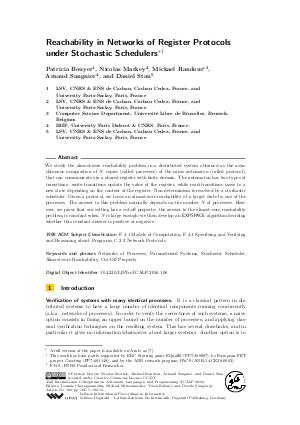Reachability in Networks of Register Protocols under Stochastic Schedulers
Authors Patricia Bouyer, Nicolas Markey, Mickael Randour, Arnaud Sangnier, Daniel Stan
-
Part of:
Volume:
43rd International Colloquium on Automata, Languages, and Programming (ICALP 2016)
Part of: Series: Leibniz International Proceedings in Informatics (LIPIcs)
Part of: Conference: International Colloquium on Automata, Languages, and Programming (ICALP) - License:
 Creative Commons Attribution 3.0 Unported license
Creative Commons Attribution 3.0 Unported license
- Publication Date: 2016-08-23
File

PDF
LIPIcs.ICALP.2016.106.pdf
- Filesize: 0.54 MB
- 14 pages
Document Identifiers
Subject Classification
Keywords
- Networks of Processes
- Parametrized Systems
- Stochastic Scheduler
- Almost-sure Reachability
- Cut-Off Property
Metrics
- Access Statistics
-
Total Accesses (updated on a weekly basis)
0PDF Downloads0Metadata Views
Abstract
We study the almost-sure reachability problem in a distributed system obtained as the asynchronous composition of N copies (called processes) of the same automaton (called protocol), that can communicate via a shared register with finite domain. The automaton has two types of transitions: write-transitions update the value of the register, while read-transitions move to a new state depending on the content of the register. Non-determinism is resolved by a stochastic scheduler. Given a protocol, we focus on almost-sure reachability of a target state by one of the processes. The answer to this problem naturally depends on the number N of processes. However, we prove that our setting has a cut-off property: the answer to the almost-sure reachability problem is constant when N is large enough; we then develop an EXPSPACE algorithm deciding whether this constant answer is positive or negative.
Cite As Get BibTex
Patricia Bouyer, Nicolas Markey, Mickael Randour, Arnaud Sangnier, and Daniel Stan. Reachability in Networks of Register Protocols under Stochastic Schedulers. In 43rd International Colloquium on Automata, Languages, and Programming (ICALP 2016). Leibniz International Proceedings in Informatics (LIPIcs), Volume 55, pp. 106:1-106:14, Schloss Dagstuhl – Leibniz-Zentrum für Informatik (2016)
https://doi.org/10.4230/LIPIcs.ICALP.2016.106
BibTex
@InProceedings{bouyer_et_al:LIPIcs.ICALP.2016.106,
author = {Bouyer, Patricia and Markey, Nicolas and Randour, Mickael and Sangnier, Arnaud and Stan, Daniel},
title = {{Reachability in Networks of Register Protocols under Stochastic Schedulers}},
booktitle = {43rd International Colloquium on Automata, Languages, and Programming (ICALP 2016)},
pages = {106:1--106:14},
series = {Leibniz International Proceedings in Informatics (LIPIcs)},
ISBN = {978-3-95977-013-2},
ISSN = {1868-8969},
year = {2016},
volume = {55},
editor = {Chatzigiannakis, Ioannis and Mitzenmacher, Michael and Rabani, Yuval and Sangiorgi, Davide},
publisher = {Schloss Dagstuhl -- Leibniz-Zentrum f{\"u}r Informatik},
address = {Dagstuhl, Germany},
URL = {https://drops.dagstuhl.de/entities/document/10.4230/LIPIcs.ICALP.2016.106},
URN = {urn:nbn:de:0030-drops-62416},
doi = {10.4230/LIPIcs.ICALP.2016.106},
annote = {Keywords: Networks of Processes, Parametrized Systems, Stochastic Scheduler, Almost-sure Reachability, Cut-Off Property}
}
